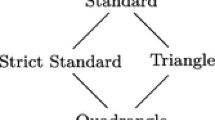Abstract
Several logic-based languages, such as Prolog II and its successors, SICStus Prolog and Oz, offer a computation domain including rational trees that allow for increased expressivity and faster unification. Unfortunately, the use of infinite rational trees has problems. For instance, many of the built-in and library predicates are ill-defined for such trees and need to be supplemented by run-time checks whose cost may be significant. In a recent paper [3], we have proposed a data-flow analysis called finite-tree analysis aimed at identifying those program variables (the finite variables) that are not currently bound to infinite terms. Here we present a domain of Boolean functions, called finite-tree dependencies that precisely captures how the finiteness of some variables influences the finiteness of other variables. We also summarize our experimental results showing how finite-tree analysis, enhanced with finite-tree dependencies is a practical means of obtaining precise finiteness information.
The MURST project, “Certificazione automatica di programmi mediante interpretazione astratta”, partly supported the work of the first two authors and EPSRC grant M05645 partly supported the work of the second and fourth authors.
Preview
Unable to display preview. Download preview PDF.
Similar content being viewed by others
References
T. Armstrong, K. Marriott, P. Schachte, and H. Søndergaard. Two classes of Boolean functions for dependency analysis. Science of Computer Programming, 31(1):3–45, 1998.
R. Bagnara. Data-Flow Analysis for Constraint Logic-Based Languages. PhD thesis, Dipartimento di Informatica, Universitá di Pisa, Pisa, Italy, 1997. Printed as Report TD-1/97.
R. Bagnara, R. Gori, P. M. Hill, and E. Zaffanella. Finite-tree analysis for constraint logic-based languages. Quaderno 251, Dipartimento di Matematica, Universitá di Parma, 2001. Available at http://www.cs.unipr.it/~bagnara/.
R. Bagnara, R. Gori, P. M. Hill, and E. Zaffanella. Finite-tree analysis for constraint logic-based languages. In P. Cousot, editor, Static Analysis: 8th International Symposium, SAS 2001, volume 2126 of Lecture Notes in Computer Science, pages 165–184, Paris, France, 2001. Springer-Verlag, Berlin.
R. Bagnara, P. M. Hill, and E. Zaffanella. Efficient structural information analysis for real CLP languages. In M. Parigot and A. Voronkov, editors, Proceedings of the7th International Conference on Logic for Programming and Automated Reasoning(LPAR 2000), volume 1955 of Lecture Notes in Computer Science, pages 189–206, Réunion Island, France, 2000. Springer-Verlag, Berlin.
R. Bagnara and P. Schachte. Factorizing equivalent variable pairs in ROBDDbased implementations of Pos. In A. M. Haeberer, editor, Proceedings of the “SeventhInternational Conference on Algebraic Methodology and Software Technology(AMAST’98)”, volume 1548 of Lecture Notes in Computer Science, pages 471–485, Amazonia, Brazil, 1999. Springer-Verlag, Berlin.
R. Bagnara, E. Zaffanella, and P. M. Hill. Enhanced sharing analysis techniques: A comprehensive evaluation. In M. Gabbrielli and F. Pfenning, editors, Proceedings of the 2nd International ACM SIGPLAN Conference on Principles and Practice of Declarative Programming, pages 103–114, Montreal, Canada, 2000. Association for Computing Machinery.
M. Codish, H. Søndergaard, and P. J. Stuckey. Sharing and groundness dependencies in logic programs. ACM Transactions on Programming Languages and Systems, 21(5):948–976, 1999.
A. Colmerauer. Prolog and infinite trees. In K. L. Clark and S. Å. Tärnlund, editors, Logic Programming, APIC Studies in Data Processing, volume 16, pages 231–251. Academic Press, New York, 1982.
A. Colmerauer. Equations and inequations on finite and infinite trees. In Proceedings of the International Conference on Fifth Generation Computer Systems (FGCS’84), pages 85–99, Tokyo, Japan, 1984. ICOT.
A. Cortesi, G. Filé, and W. Winsborough. Prop revisited: Propositional formula as abstract domain for groundness analysis. In Proceedings, Sixth Annual IEEE Symposium on Logic in Computer Science, pages 322–327, Amsterdam, The Netherlands, 1991. IEEE Computer Society Press.
A. Cortesi, B. Le Charlier, and P. Van Hentenryck. Combinations of abstract domains for logic programming: Open product and generic pattern construction. Science of Computer Programming, 38(1–3), 2000.
P. Cousot and R. Cousot. Abstract interpretation: A unified lattice model for static analysis of programs by construction or approximation of fixpoints. In Proceedings of the Fourth Annual ACM Symposium on Principles of Programming Languages, pages 238–252, 1977.
P. Cousot and R. Cousot. Abstract interpretation and applications to logic programs. Journal of Logic Programming, 13(2&3):103–179, 1992.
P. Cousot and R. Cousot. Abstract interpretation frameworks. Journal of Logic and Computation, 2(4):511–547, 1992.
P. M. Hill, R. Bagnara, and E. Zaffanella. Soundness, idempotence and commutativity of set sharing. Theory and Practice of Logic Programming, 2001. To appear. Available at http://arXiv.org/abs/cs.PL/0102030.
B. Intrigila and M. Venturini Zilli. A remark on infinite matching vs infinite unification. Journal of Symbolic Computation, 21(3):2289–2292, 1996.
A. King. Pair-sharing over rational trees. Journal of Logic Programming, 46(1–2):139–155, 2000.
K. Marriott and H. Søndergaard. Notes for a tutorial on abstract interpretation of logic programs. North American Conference on Logic Programming, Cleveland,Ohio, USA, 1989.
K. Marriott and H. Søndergaard. Precise and efficient groundness analysis for logic programs. ACM Letters on Programming Languages and Systems, 2(1–4):181–196,1993.
E. Schröder. Der Operationskreis des Logikkalkuls. B. G. Teubner, Leibzig, 1877.
H. Søndergaard. An application of abstract interpretation of logic programs: Occur check reduction. In B. Robinet and R. Wilhelm, editors, Proceedings of the 1986 European Symposium on Programming, volume 213 of Lecture Notes in ComputerScience, pages 327–338. Springer-Verlag, Berlin, 1986.
Author information
Authors and Affiliations
Editor information
Editors and Affiliations
Rights and permissions
Copyright information
© 2001 Springer-Verlag Berlin Heidelberg
About this paper
Cite this paper
Bagnara, R., Zaffanella, E., Gori, R., Hill, P.M. (2001). Boolean Functions for Finite-Tree Dependencies. In: Nieuwenhuis, R., Voronkov, A. (eds) Logic for Programming, Artificial Intelligence, and Reasoning. LPAR 2001. Lecture Notes in Computer Science(), vol 2250. Springer, Berlin, Heidelberg. https://doi.org/10.1007/3-540-45653-8_40
Download citation
DOI: https://doi.org/10.1007/3-540-45653-8_40
Published:
Publisher Name: Springer, Berlin, Heidelberg
Print ISBN: 978-3-540-42957-9
Online ISBN: 978-3-540-45653-7
eBook Packages: Springer Book Archive




